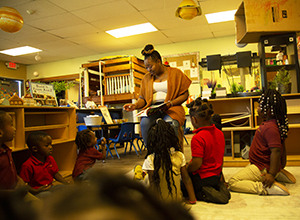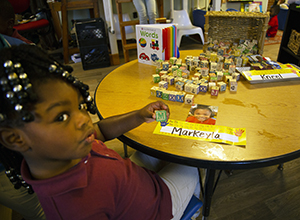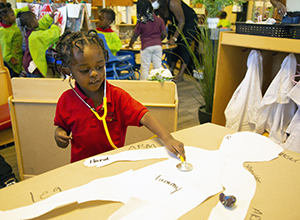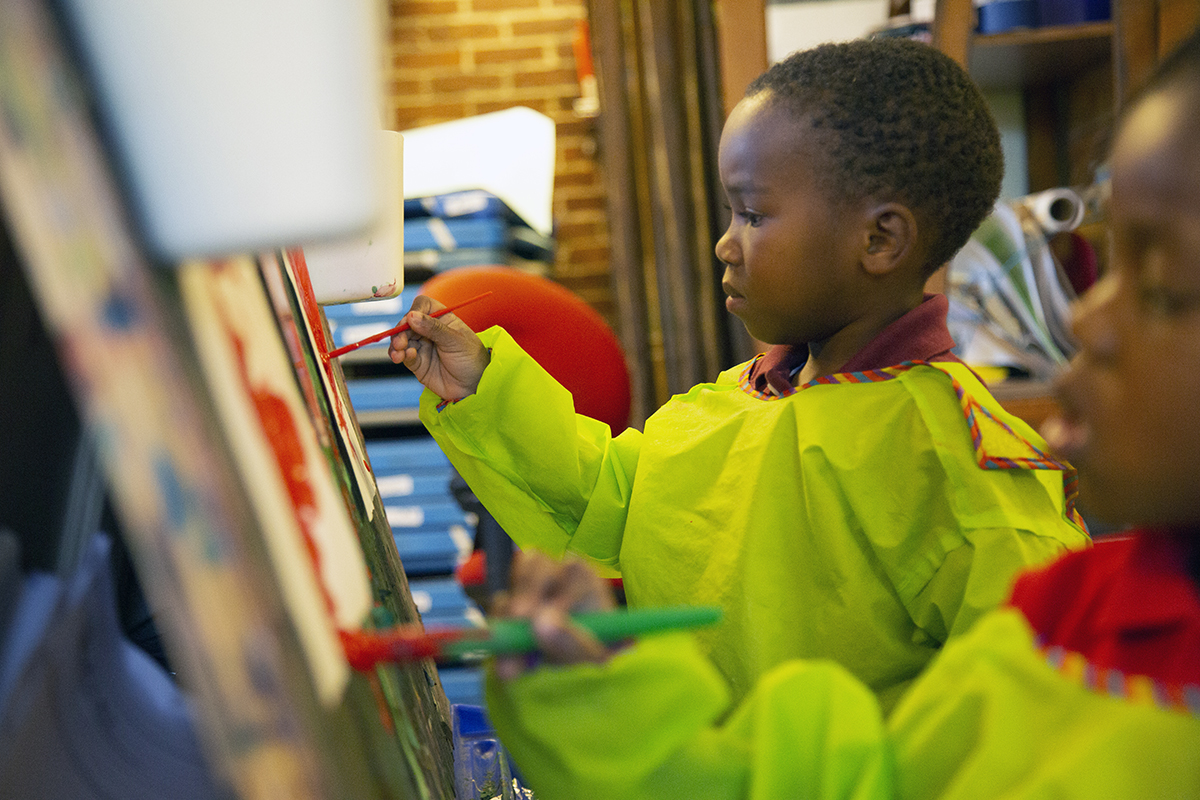Since becoming a mother, Jameshay McConnell has had to turn down jobs, or even quit them, because she couldn’t find affordable and reliable childcare for her 4-year-old son.
It was a conundrum she faced when offered a medical assistant’s job in the fall. Then a friend told her about Beginning Futures Learning Center just five minutes from McConnell’s home in St. Louis’s Walnut Park neighborhood.
It was affordable with flexible hours. It was also fully accredited. “I was literally calling every day hoping to get him in,” McConnell said.

Executive Director Rochelle Bea reads to preschoolers.
Executive Director Rochelle Bea opened Beginning Futures in 2008 with a start-up grant from the Missouri Department of Elementary and Secondary Education. She chose a building in Walnut Park in response to the need. Transportation challenges and high tuition make pre-K out of reach for many parents in this part of the city. A report from IFF titled “The First Step to Equity” rated the neighborhood as “lowest access” in terms of the availability of subsidized childcare.
“I wanted to make a positive change,” Bea said. “A quality childhood center was what was missing.”
A foundation for learning

A preschooler works on early literacy skills.
Beginning Futures is part of the STL PreK Cooperative, which in two years has expanded access to high-quality pre-K in underserved neighborhoods across the city. The cooperative received seed funding and has ongoing support from the Opportunity Trust, which considers access to quality pre-K a strategy to building a strong foundation for later success in school.
Research shows that the years between birth and kindergarten are critical as children begin to learn how to socialize with peers and adults, as well as develop cognitive, social and emotional skills that lay a broad foundation for learning.
Once McConnell secured a spot for her son, Josiah, she was anxious about how he’d do. He hadn’t spent much time with other children his age, she said.
Inside Beginning Futures, classroom walls are filled with children’s art and whimsical tree houses that serve as quiet time nooks. Planets hang from the ceiling.
On one particular day, the preschool classrooms were set up to resemble grocery stores. Josiah stood at a table with a friend, cutting out pictures of food from a newspaper adsheet to make his shopping list. In several months time, he’s made friends and developed skills that will prepare him for kindergarten next year.
“He’s advanced a lot,” McConnell said. “He talks more at home. He’s more active with other kids. He can sometimes tell me what time it is. They’ve got him reading books.”
After a discussion about the food pyramid and different methods of payment, Josiah set out to choose his groceries, count and weigh produce at the register. He used paper money to pay.
A 4-year-old girl working the red plastic register put two of Josiah’s plastic potatoes on the scale, with plastic radishes on the other side.
“We’re going to count to see how many radishes will make it equal,” teacher Justice Perkins said, crouching beside them. They counted nine plastic radishes together and watched the scale tip until it became the equal weight.
Meeting a need
Bea’s passion for early childhood education grew from her experience as a mother, trying to navigate St. Louis’s public education system and get support for her daughter. Her background is social work. She grew up in an adjacent neighborhood and understood the potential impact a center could have offering quality childcare and pre-K.

A girl checks the heartbeat of a body cutout.
“We’re trying to create a place where children and families feel safe,” she said. “Where they enjoy coming. That they’ll know they’ll get consistency.”
She also wanted it to offer top-notch instruction – the kind that allows children to learn while playing and enter kindergarten fully prepared. With state grants, Bea renovated and expanded the center’s building on Thrush Avenue. Then she set out to ensure that all teaching staff are certified.
Beginning Futures now serves 120 children ages birth to six, as well as elementary school-aged children who need before or after-school care. The Opportunity Trust is providing Bea with financial support – using grants from PNC and the Saigh Foundation – to help with capacity building, which is allowing her to focus on further expansion.
Bea also works with the parents, inspiring them to turn everyday spaces at home into learning spaces, and how to advocate for their children. “This is the start of their educational careers,” she tells them. “You are your child’s biggest advocate.”
McConnell said she had anxiety about leaving her son in someone else’s hands.Those fears quickly disappeared as she watched Josiah develop friendships and learn, and as she spent more time at Beginning Futures.
“He’s excited when I drop him off. He’s excited when I pick him up. I never have to worry if my baby’s ok,” McConnell said. “It’s been the perfect place.”
